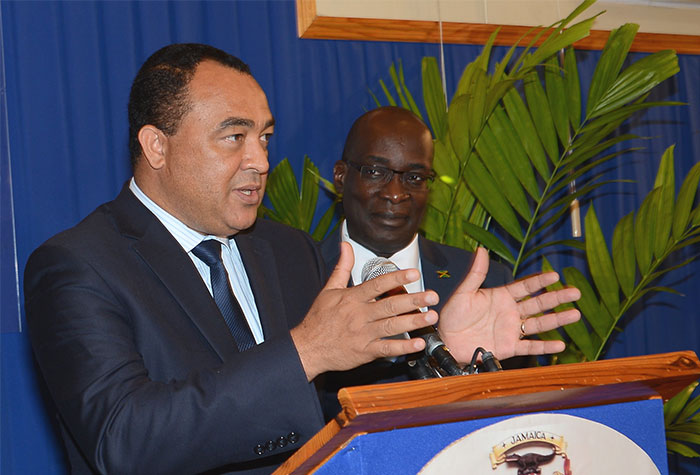Frontline Health Workers Vaccinated
By: , March 23, 2016The Key Point:
The Facts
- This was disclosed by Minister of Health, Dr. the Hon. Christopher Tufton, during the Post Cabinet press briefing, held at the Office of the Prime Minister, in Kingston, on March 22.
- The National Influenza Centre has reported 71 confirmed cases of influenza so far this year, 66 of which were Influenza A (H1N1) and the remaining five were different strains of the virus.
The Full Story
Approximately 90 percent of frontline health workers have received vaccination to protect themselves against the Influenza A (H1N1) virus.
This was disclosed by Minister of Health, Dr. the Hon. Christopher Tufton, during the Post Cabinet press briefing, held at the Office of the Prime Minister, in Kingston, on March 22.
“It’s a voluntary process. In the past, I’m told that between 25 and 30 percent would opt not to be vaccinated. Vaccination really represents you being injected with a small dosage of the virus and then you develop your own systems to fight it and some people have a difficulty with that,” he said.
The National Influenza Centre has reported 71 confirmed cases of influenza so far this year, 66 of which were Influenza A (H1N1) and the remaining five were different strains of the virus.
As at March 20, 2016, there were six deaths of persons who have been confirmed to have Influenza A (H1N1). The persons who died had risk factors for other severe diseases.
The Minister said that since the outbreak and the tragic loss of a few of the island’s health practitioners, “we have seen a greater take-up, which we think is a good idea.”
In the meantime, he noted that the Ministry has ordered additional vaccines from Trinidad, which is expected to be in the island shortly.
Additionally, Dr. Tufton said the vaccine is also available in the private sector for persons who may choose to exercise that right. The cost for the vaccine ranges from $1,200 to $1,500 per dose.
He informed that the Ministry received 5,000 additional doses of flu vaccines in addition to the 3,000 and 400 paediatric doses that were previously distributed to the Regional Health Authorities.
Dr. Tufton said that all registered physicians are now able to prescribe Tamiflu, the antiviral medication used for treating influenza, adding that instructions for preparations to begin for the next flu season have already been given.
Symptoms of the H1N1 virus are similar to seasonal influenza and may include sneezing, coughing, runny and stuffy nose, fatigue and headache.
Meanwhile, the Minister said the Ministry’s National Emergency Operations Centre will continue to coordinate the response, and that the public education campaign has been ramped up in the form of television, radio and print messages.
“Public education materials have been distributed to several schools, workplaces and all Regional Health Authorities. Regular press releases are also sent out to the media,” he added.
Dr. Tufton informed that H1N1 related information is also placed on the Ministry’s website as well as social media platforms.




